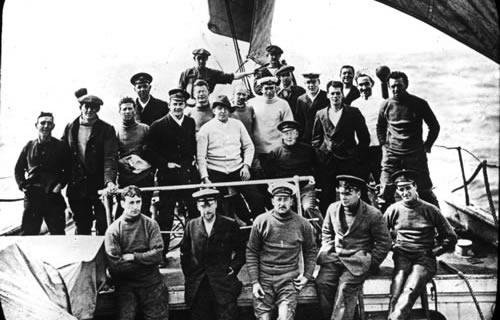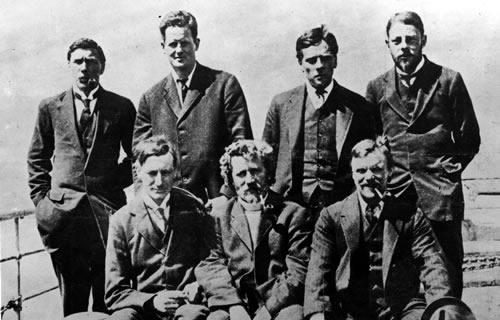
Weddell Sea party

Ross Sea party
New Zealand involvement in Endurance expedition rescues
Led by British explorer Sir Ernest Shackleton, the Imperial Trans-Antarctic Expedition (1914-17) - or Endurance expedition - aimed to complete the first land crossing of Antarctica. But it failed entirely in this aim and is instead remembered as an incredible survival story. The expedition's two parties sailed to opposite sides of the Antarctic continent, with separate tasks, but both eventually found themselves trapped in inhospitable surroundings with insufficient supplies. The navigation skills of a New Zealander, Frank Worsley, played a crucial role in the rescue of the main party, while other New Zealanders, and the government, contributed to the rescue of the support party.
The Weddell Sea Party
The main or Weddell Sea Party, which was meant to make the Antarctic crossing, failed to even reach the continent. They left South Georgia on 5 December 1914 but within days of their departure struck pack ice in the Weddell Sea. After two months of unpredictable progress their vessel, the Endurance, captained by New Zealander Frank Worsley, became trapped between ice floes. The party spent autumn and winter onboard drifting with the pack - with Shackleton hoping to free the vessel when the pack broke up in the spring. But when the melt came it bought immense pressure upon the Endurance. In October 1915 the vessel was crushed and the party was forced to abandon it for the ice floe.
They spent much of the following summer and autumn camping on the ice floe; Shackleton also organised two aborted marches across the floe in the hope of reaching land. Then on 8 April 1916 the floe suddenly split and the party was forced to take to the three lifeboats they had carried with them. Over the next week the party - with Worsley as navigator - made its way to Elephant Island. They reached solid land but the island was uninhabited and rarely visited. If they were to be rescued it remained necessary for some of the party to make the voyage to South Georgia - 1300 kms away.
Shackleton led the rescue party, selecting five men to accompany him. Among them was carpenter Harry McNeish, who modified the 6.7-m lifeboat, the James Caird, for the journey, and Worsley, who was appointed navigator. Despite harrowing conditions and navigational difficulties, the party reached South Georgia on 10 May 1916. The 16-day voyage is still considered ‘one of the greatest boat journeys ever accomplished'.
But the party's journey was not yet over. They had landed on the uninhabited west coast of South Georgia and faced a lengthy overland journey to reach a whaling station in the east. Shackleton, Worsley and Thomas Crean made the arduous 36-hour journey across glaciers and mountains with little more than a length of rope, an adze and a compass. Then, a little under a day after reaching the whaling station, Worsley set out to rescue the remainder of the lifeboat party from the west. At the same time Shackleton began preparations to rescue his men from Elephant Island. By the time Shackleton arrived on Elephant Island - four attempts and four months later - the remaining party's supplies were nearly exhausted and they were seriously considering trying to sail to another island.
The Ross Sea Party
Throughout this period the support or Ross Sea Party, which was tasked with laying depots for the crossing, was unaware of the problems facing the Weddell Sea Party. Their vessel, the Aurora, arrived in Antarctica in January 1915 and a shore party immediately set about establishing a base at Cape Evans and laying depots. The depot-laying party faced setbacks during their first season, including the death of ten dogs. Their problems were compounded in May when the Aurora became trapped in sea ice and was carried away - along with two members of the shore party and most of their supplies. Despite their difficulties the shore party carried out their depot-laying tasks the following season - believing that the lives of Shackleton and his men were depending on them.
With assistance from New Zealand in the latter part of its journey, the Aurora finally made it to Port Chalmers on 2 April 1916. It was almost a year since it had been carried from Antarctica, stranding the shore party. As there was also no news of the Weddell Sea Party there was conflict over which party should be given priority. Eventually the British, Australian and New Zealand governments agreed to contribute funds to a rescue effort to the Ross Sea. The New Zealand government also agreed to meet other liabilities, including the crew's wages. As efforts began to ready the Aurora, news arrived of the Weddell Sea Party. Shackleton learned there was still one more rescue needed - but this time he had to fight to be involved. The governments, which were now claiming ownership of the Aurora, insisted that it be captained by John King Davis. Eventually, through the intervention of New Zealand Minister of Marine Robert McNab, an agreement was reached between Shackleton and Davis. The Aurora left Port Chalmers on 20 December 1916, with Davis as captain and Shackleton signed on as a supernumerary officer.
The Ross Sea Party sighted the Aurora on the morning of 10 January 1917. In the hours that followed Shackleton learned that three of his men had died, while the seven survivors discovered that all their efforts had been in vain. The men of the Ross Sea Party and their rescuers arrived in Wellington on 9 February to a heroes' welcome. But interest in their story was quickly lost amid the terrible carnage of the First World War.
Further information
Books
- Alfred Lansing, Endurance: The true story of Shackleton's incredible voyage to the Antarctic, Weidenfeld & Nicholson, London, 1999
- Richard McElrea & David Harrowfield, Polar castaways: The Ross Sea Party (1914-17) of Sir Ernest Shackleton, Canterbury University Press, Christchurch, 2004
- John Thomson, Shackleton's captain: A biography of Frank Worsley, Hazard Press, Christchurch, 1998
- F A Worsley, The great Antarctic rescue: Shackleton's boat journey, Times Books, London, 1977
Links
- The Imperial Trans-Antarctic Expedition (Wikipedia)
-
Sir Ernest Shackleton (Wikipedia)
-
Ross Sea Party (Wikipedia)
-
Trans-Antarctic Expedition (south-pole.com)
- The James Caird (The James Caird Society)




Community contributions